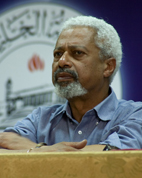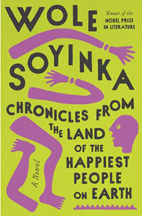 You may have heard that Tanzanian novelist Abdulrazak Gurnah has just been awarded the Nobel Prize for Literature. He is perhaps best known for his novel Paradise, which was shortlisted for the Booker Prize in 1994. While focused on ordinary people, his work always has a political dimension, as is so common in African literature. He has maintained that focus, even though most of his writing has been done in Britain, where for many years he was professor of English and post-colonial literatures at the University of Kent. Paradise in some ways ironically parallels Joseph Conrad’s Heart of Darkness, a text to which Chinua Achebe took great exception. Gurnah’s editor at Bloomsbury claims that he is as significant a writer as Achebe, a revered figure in African letters.
You may have heard that Tanzanian novelist Abdulrazak Gurnah has just been awarded the Nobel Prize for Literature. He is perhaps best known for his novel Paradise, which was shortlisted for the Booker Prize in 1994. While focused on ordinary people, his work always has a political dimension, as is so common in African literature. He has maintained that focus, even though most of his writing has been done in Britain, where for many years he was professor of English and post-colonial literatures at the University of Kent. Paradise in some ways ironically parallels Joseph Conrad’s Heart of Darkness, a text to which Chinua Achebe took great exception. Gurnah’s editor at Bloomsbury claims that he is as significant a writer as Achebe, a revered figure in African letters.
Read a quick guide to Gurnah and his fiction here, while here is an interview with him.
 Gurnah is the first black writer to receive the Nobel Prize for Literature for 28 years, when American writer Toni Morrison won in 1993. He is the first black African writer since Wole Soyinka, who received the prize in 1986. Soyinka is another immensely significant figure of African literature. Primarily known as playwright and a poet, he has just published his first novel for 50 years, The Chronicles from the Land of the Happiest People on Earth. Another writer with a clear political awareness – he was imprisoned by the Nigerian government for nearly two years during the civil war – the title of his latest book is clearly ironic.
Gurnah is the first black writer to receive the Nobel Prize for Literature for 28 years, when American writer Toni Morrison won in 1993. He is the first black African writer since Wole Soyinka, who received the prize in 1986. Soyinka is another immensely significant figure of African literature. Primarily known as playwright and a poet, he has just published his first novel for 50 years, The Chronicles from the Land of the Happiest People on Earth. Another writer with a clear political awareness – he was imprisoned by the Nigerian government for nearly two years during the civil war – the title of his latest book is clearly ironic.
Read a review of it here, by Ben Okri, another important Nigerian writer.
And here is an interesting and revealing interview with Soyinka.